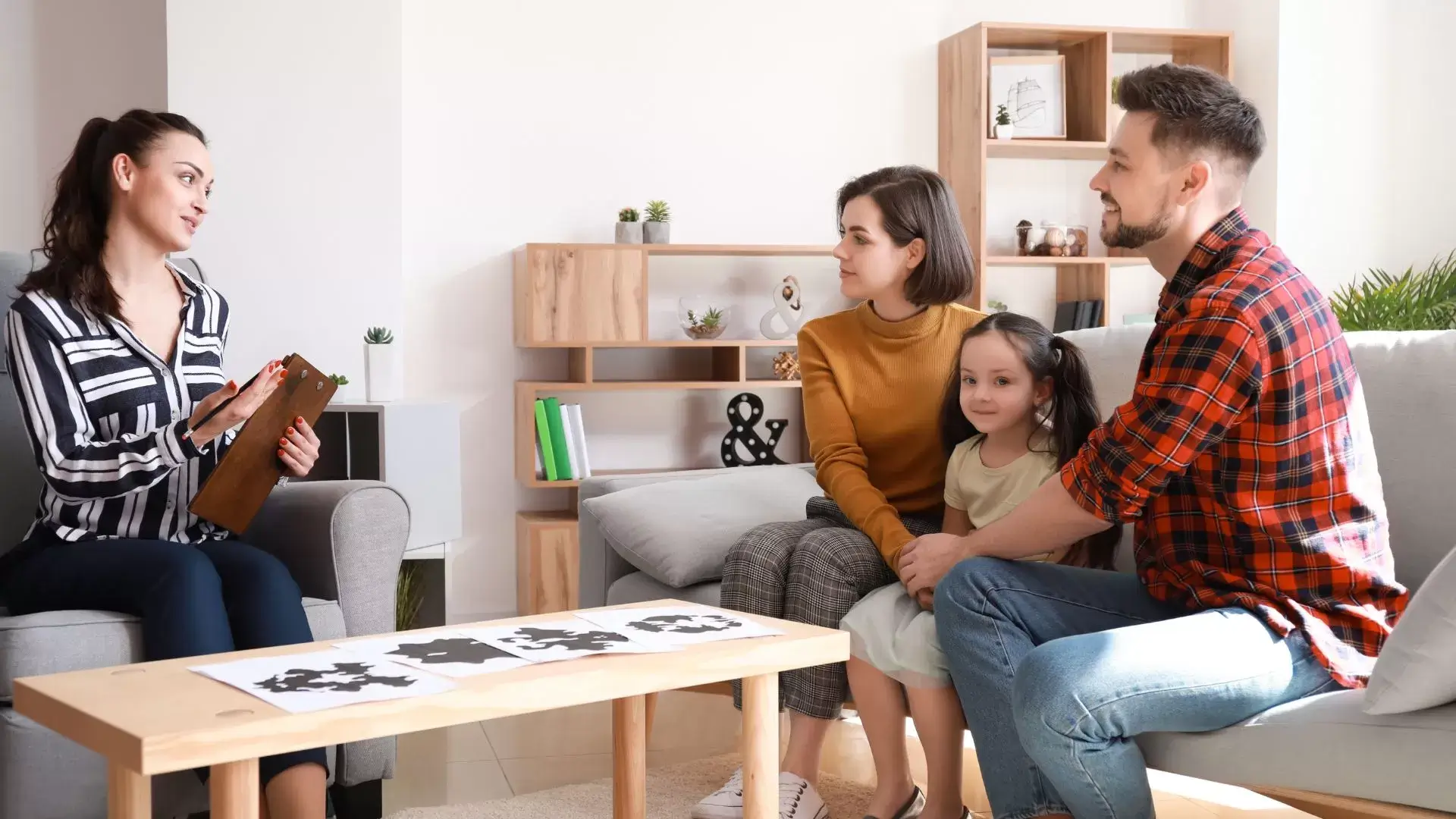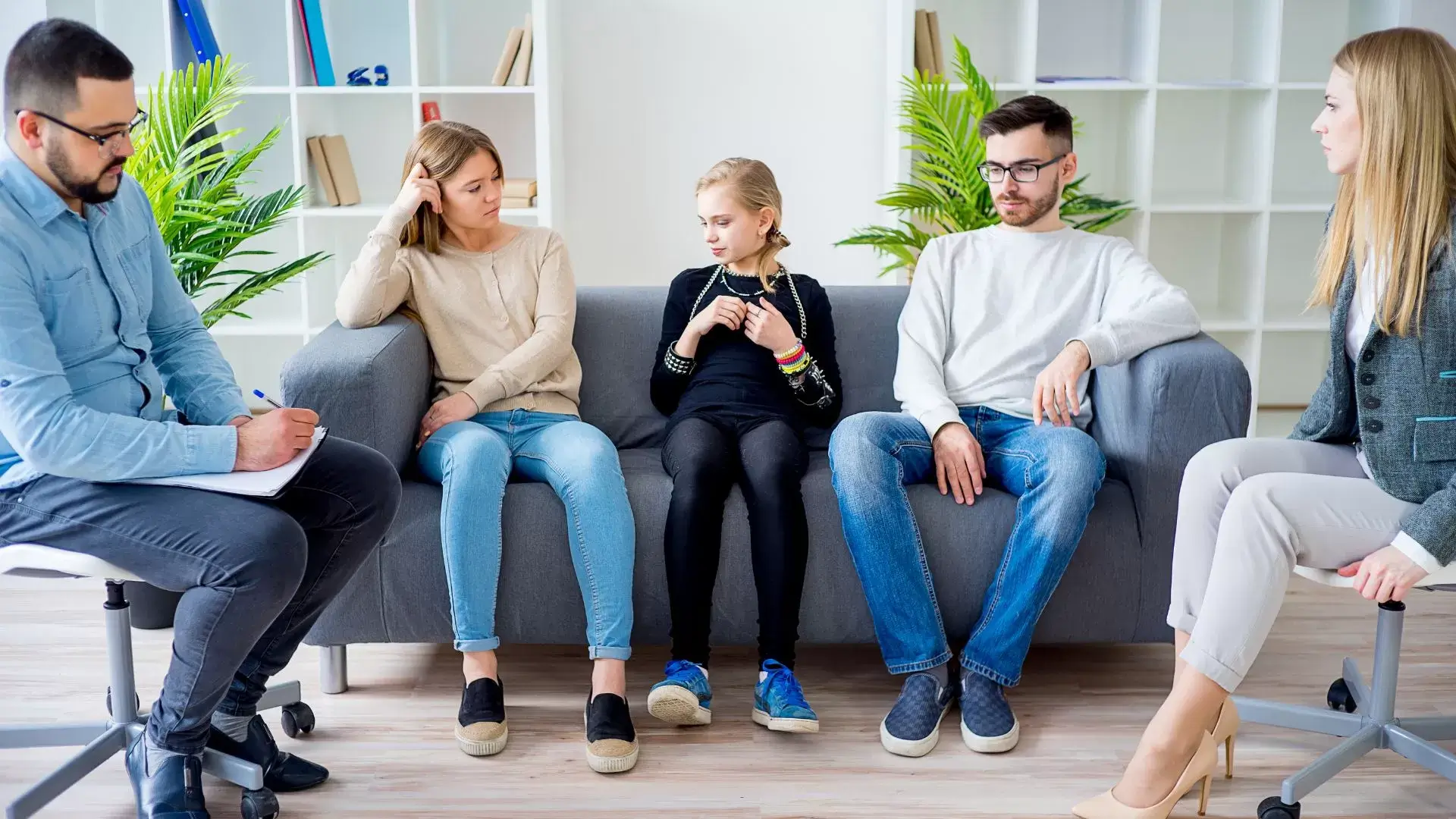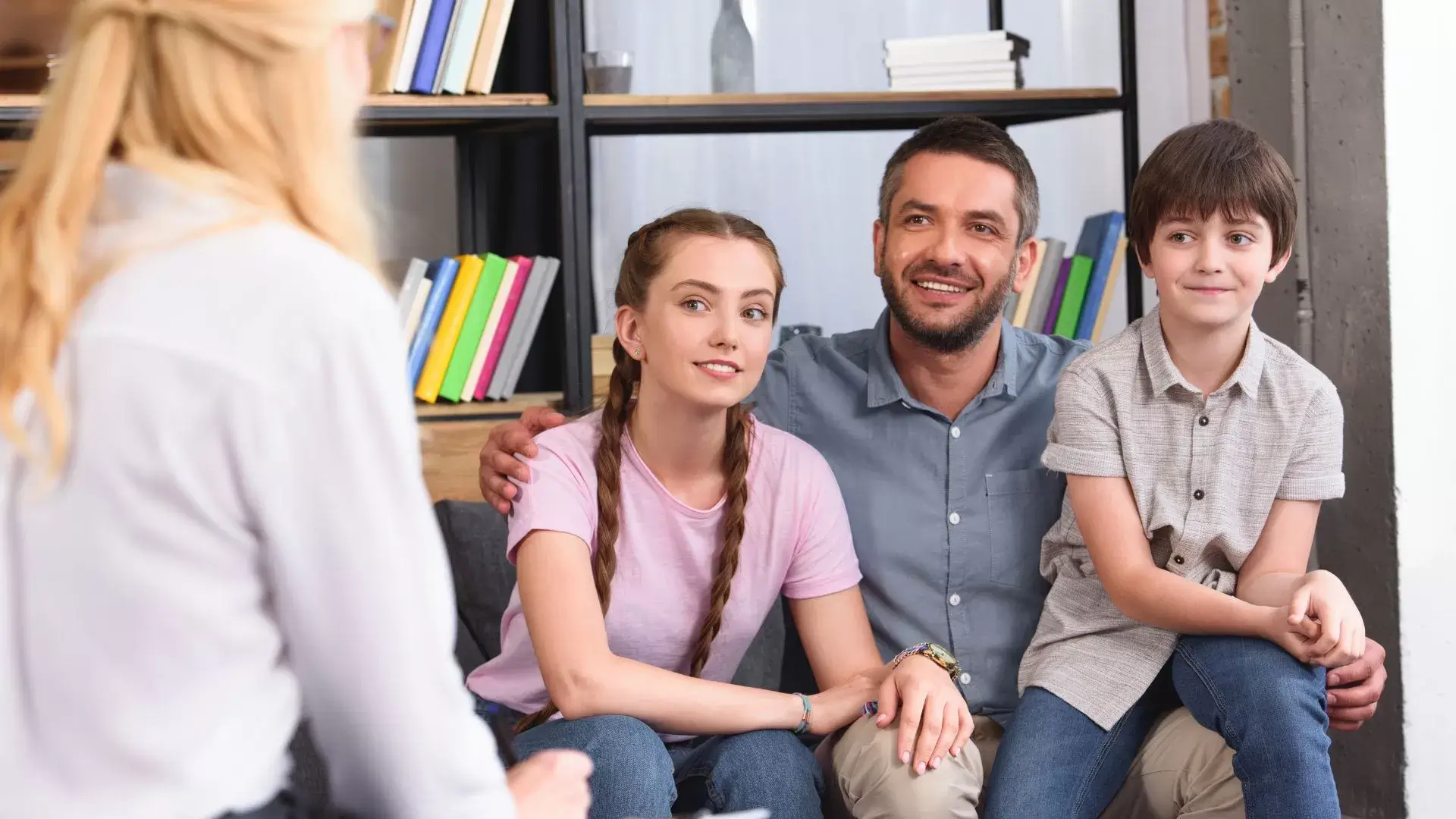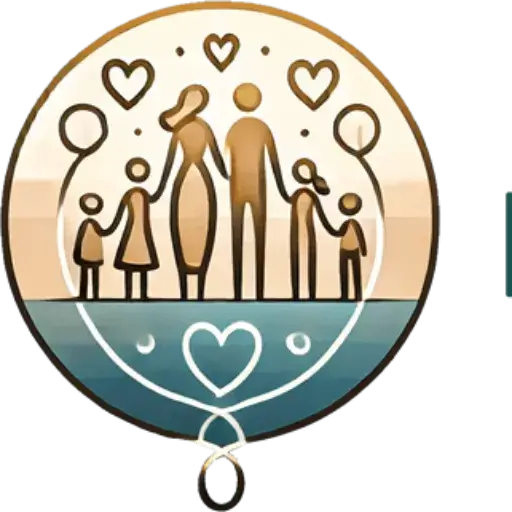Family Counselling Therapy for Trauma
Family Counselling Therapy for trauma helps us navigate the emotional storm trauma creates within our relationships. It provides a safe space where we can openly discuss our feelings, fostering understanding and healing. By enhancing our communication skills, we learn to express ourselves and listen to one another, which strengthens our family bonds. A skilled therapist guides us through this journey, addressing the unique challenges each family member faces. Together, we focus on creating a supportive environment that promotes resilience. If we explore further, we’ll uncover more about the specific steps involved in this transformative process.

About Family Counselling Therapy
Family counselling therapy helps us navigate the complexities of our relationships, fostering understanding and healing within the family unit. By engaging in family therapy sessions, we can explore the intricate family dynamics that shape our interactions. This therapeutic counselling approach provides a safe space for us to discuss our feelings, thoughts, and experiences, ensuring emotional support in families.
Through communication skills therapy, we learn to express ourselves more effectively and listen empathetically to one another. This enhances our ability to resolve conflicts in families, turning potential disagreements into opportunities for growth. We recognize that trauma-informed therapy is essential, as it helps us understand the impact of past experiences on our current relationships and emotional well-being.
As we work together in this supportive environment, we foster family healing, allowing us to address unresolved issues and strengthen our bonds. Ultimately, family counselling therapy empowers us to create a healthier and more harmonious family atmosphere. By prioritizing our family emotional well-being, we can better support each other through challenges, building resilience that benefits every member of our family.
Understanding Trauma and Its Impact on Families
Trauma can ripple through our lives, affecting not just individuals but also the intricate relationships and dynamics within our families. When we experience trauma, it can challenge our mental health and emotional resilience, altering how we connect with each other. In family counselling therapy, we can explore these changes together, helping us understand their impact on our family systems.
By engaging in therapy for family issues, we can identify unhealthy coping mechanisms that may have developed in response to trauma. This journey involves open dialogue, allowing us to communicate our feelings and experiences without judgment. Family communication therapy can enhance our understanding of each other, fostering a supportive environment for healing.
Moreover, we may find that grief counselling plays a vital role in processing shared losses and emotions. Recognizing our relationship dynamics can help us navigate the aftermath of trauma, strengthening our bonds. As we work together, we cultivate resilience, transforming our challenges into opportunities for growth. Understanding trauma’s impact on our families is the first step towards healing, and together, we can create a pathway to recovery that honors our shared experiences.

The Role of a Family Therapist in Trauma Recovery
In our journey toward healing, the family therapist serves as a compassionate guide, helping us navigate the complexities of trauma recovery within our family dynamics. They offer family counselling services that foster understanding and communication, ensuring we feel heard and supported. As emotional resilience specialists, these therapists empower us to rebuild our emotional health, teaching us essential coping strategies.
Through approaches like behavioral therapy and family-focused therapy, our therapist encourages us to explore our feelings and reactions. They facilitate parent-child therapy, creating safe spaces for family members to express their emotions and strengthen their bonds. As relationship counsellors, they help us address conflicts and improve our interactions, enhancing our overall mental wellness.
Trauma-Informed Care in Family Counselling
Understanding the principles of trauma-informed care can greatly enhance our family counselling experience, creating a safe environment for healing and connection. By integrating trauma-informed care into our family therapy techniques, we can address the emotional regulation needs of each family member, fostering better communication and understanding.
In our sessions, we’ll focus on recognizing how anxiety in families can manifest and affect overall family dynamics. This approach allows us to develop tailored strategies for stress management that resonate with everyone involved, supporting family mental health care holistically.
We can also explore integrative family therapy, which combines various methods to address the unique challenges we face. Through psychological therapy, we’ll work on building resilience and coping mechanisms while ensuring that parental guidance is provided in a supportive manner.

Cognitive-Behavioral Therapy for Families Dealing with Trauma
Cognitive-behavioral therapy offers us a structured approach to help families navigate the complexities of trauma, focusing on how our thoughts and behaviors can influence emotional healing. In family counseling therapy, we work closely with a family therapist to identify anxiety symptoms that may arise from traumatic experiences. By understanding these symptoms, we can develop effective anxiety coping strategies together.
Throughout the family therapy process, we engage in open discussions that promote family relationship building. This collaborative environment allows each family member to express their feelings, fostering emotional well-being for everyone involved. We learn to recognize negative thought patterns and replace them with healthier perspectives, empowering us to support each other on our healing journey.
As we explore our trauma with the guidance of a mental health professional, we grow stronger as a family unit. Cognitive-behavioral therapy encourages us to develop resilience and coping mechanisms that not only address current challenges but also prepare us for future adversities. Together, we can create a nurturing atmosphere that prioritizes healing, understanding, and connection, paving the way for a brighter, more hopeful future.
Family Systems Therapy: Healing Trauma within the Family Unit
Family systems therapy invites us to explore the interconnected dynamics within our family, helping us to heal trauma collectively and strengthen our bonds. It’s about recognizing that our individual experiences are woven into the fabric of our family unit. When we engage with a family therapist or a licensed counsellor, we begin to understand how trauma within the family unit affects everyone, including our children and adolescents.
Through family health counselling, we can address the underlying issues that contribute to stress and emotional struggles. This collaborative approach allows us to share our feelings and experiences, fostering open communication and empathy. Parental counselling can be particularly beneficial, as it equips us with tools to support our children’s mental health and enhance family wellness.
Marriage and family therapy also plays a vital role in helping us navigate complex relationships, ensuring that we’re all heard and valued. Together, we can work towards healing and building resilience, creating a nurturing environment for everyone. By embracing family systems therapy, we’re not just addressing individual trauma; we’re fostering a healthier, more connected family dynamic that promotes lasting wellbeing.
Parent-Child Therapy for Trauma Recovery
In traversing the complex landscape of trauma recovery, parent-child therapy offers a safe space for both parents and children to heal together and rebuild their emotional connection. This approach not only fosters understanding but also nurtures the trust that may have been affected by trauma. By engaging in family counselling therapy, we can explore the dynamics of our relationships and work towards healthier interactions.
As we collaborate with a child and adolescent counsellor, we gain valuable insights into the unique challenges our children face, particularly regarding anxiety in children. This guidance is essential for us as parents, providing vital support for parents steering through their own feelings while helping our children cope with their emotions.
Utilizing family behavioral therapy techniques, we can develop effective communication strategies that promote healing. A marriage and family therapist can assist us in integrating our healing processes, ensuring that we’re all on the same path to recovery. Through mental health awareness, we can better understand the impact of trauma and work together towards resilience, ensuring that our family emerges stronger and more connected than ever.
Couples Therapy in the Context of Trauma
Steering through the challenges of trauma together can strengthen our bond as couples, providing an opportunity to rebuild trust and intimacy while facing the emotional aftermath as a united front. In couples therapy, we engage in a space where our experiences are validated, and our feelings are acknowledged. A skilled psychotherapist can guide us in addressing relationship issues that arise from trauma, helping us to better understand each other’s emotional needs.
Through marriage counselling, we can develop effective communication strategies that foster emotional support. We learn to express our feelings without fear, creating a safe environment for vulnerability. Conflict resolution becomes a key focus, allowing us to address disagreements constructively rather than letting them fester.
As we begin these healing processes, we discover that trauma doesn’t have to define us. Instead, it can serve as a catalyst for growth. With commitment and the right guidance, we can transform our relationship into a resilient partnership, equipped to face future challenges together. By prioritizing our emotional connection, we’re not just healing from trauma; we’re also building a stronger, more fulfilling relationship.
Family Dynamics and Trauma: Building Emotional Resilience
How do we navigate the complexities of trauma within our family dynamics to foster emotional resilience and support each other in healing? We can begin by embracing family-centered counselling, which helps us understand how trauma impacts our relationships and communication. By opening those lines of communication, we create a safe space to explore our feelings together.
In this journey, we can utilize anxiety therapy and stress reduction techniques to manage our individual and collective experiences of anxiety. Together, we can explore parenting strategies that promote emotional resilience in our children, ensuring they feel supported and understood.
Participating in group therapy or anxiety support groups can also enhance our healing process, as we share experiences and learn from others facing similar challenges. Couples and family therapy can be a powerful tool to strengthen our connections and develop empathy for one another, turning trauma into an opportunity for growth.
Ultimately, by prioritizing emotional resilience and understanding our family dynamics, we can create a nurturing environment that fosters healing, compassion, and deeper bonds among us. Together, we can transform our trauma into a pathway toward hope and recovery.
Therapeutic Interventions for Trauma in Family Therapy
Recognizing the profound impact trauma can have on our family dynamics, we can explore various therapeutic interventions that promote healing and connection among us. Family counselling therapy can serve as a safe space where we work together with a family therapist to address our unique challenges. One effective approach is child therapy, which helps our younger members express their feelings and cope with trauma, fostering resilience.
Additionally, sibling therapy can strengthen bonds and enhance communication between brothers and sisters, allowing them to share their experiences in a supportive environment. For couples experiencing conflict due to trauma, couple conflict resolution techniques can facilitate understanding and empathy, enabling us to rebuild trust and intimacy.
Furthermore, we can benefit from family guidance services that provide strategies for anxiety management, helping us navigate the emotional turmoil that often accompanies trauma. By implementing these therapeutic interventions, we can create a stronger, healthier family unit. Through collaboration and empathy, we can collectively address the effects of trauma, ensuring that each member feels heard and supported on our journey toward healing.
Addressing Anxiety and Depression in Families with Trauma
When we confront the lingering effects of trauma, it is essential to acknowledge how anxiety and depression can weave their way into our family life, impacting each member’s emotional well-being. In family counselling therapy, we can explore how these feelings manifest in our relationships, creating a cycle of stress that often feels unbreakable.
Through anxiety treatment, we can learn about anxiety disorders and their influence on our daily lives. In our anxiety therapy sessions, we can work together with a cognitive-behavioral therapist to identify triggers and develop coping strategies. This collaborative approach allows us to practice grounding techniques that provide immediate stress relief during overwhelming moments.
Moreover, we must prioritize self-care for anxiety as a family. By creating a supportive environment, we can encourage open conversations about our feelings and validate each other’s experiences. This shared understanding fosters a sense of connection and resilience, helping us to navigate the challenges of anxiety and depression together. Ultimately, we can reclaim our family’s emotional well-being, transforming trauma into a pathway for healing and growth.
Holistic Approaches to Family Therapy for Trauma Healing
A holistic approach to family therapy can create a nurturing space where we collectively explore the intricate layers of trauma and its impact on our relationships. By integrating various therapeutic modalities, we can enhance our journey toward trauma healing. A family therapist can guide us in understanding how our emotional and physical responses to trauma may trigger anxiety disorders in teens and adults alike.
Incorporating parenting coaching into our sessions can empower us to develop effective strategies for fostering resilience in our children. We can learn calming techniques that not only provide immediate anxiety relief but also promote long-term nervous system regulation. Together, we can discuss anxiety treatment options that cater to our unique family dynamics, allowing us to support one another in facing challenges.
Through these holistic approaches, we can create a safe environment where we feel heard and understood. By embracing each family member’s experiences, we can cultivate stronger connections and foster healing. Our shared journey allows us to navigate trauma collectively, transforming our pain into growth and resilience, as we learn to nurture not just ourselves but each other.
The Family Therapy Process: Steps to Trauma Recovery
Steering the family therapy process together can be a transformative journey toward trauma recovery, allowing us to rebuild trust and strengthen our connections. In our sessions with a family therapist, we’ll begin by exploring our individual anxiety triggers and mapping out an anxiety symptoms checklist. This helps us recognize the thought patterns that contribute to our distress.
Next, we’ll work collaboratively to develop an anxiety treatment plan tailored to our unique needs. Incorporating exposure therapy allows us to confront and process our trauma in a safe environment. Using calming exercises and relaxation techniques, we’ll learn to manage our anxiety and foster a sense of safety within our family unit.
Throughout this process, it’s essential that we support each other, acknowledging our feelings and sharing our experiences openly. By practicing these strategies together, we can create a nurturing space that encourages healing. As we progress, we’ll celebrate small victories in our anxiety recovery, reinforcing our commitment to one another. Together, we’ll navigate the complexities of trauma, emerging stronger and more connected as a family.
Support for Parents and Caregivers in Trauma Recovery
Supporting parents and caregivers in trauma recovery is essential, as they play a key role in creating a safe environment for healing and growth within the family. When parents face challenges like anxiety in adults, it can affect the entire family dynamic. That’s where emotional support becomes vital. Together, we can explore family counselling therapy to help us navigate these turbulent waters.
As caregivers, we often need our own support systems to address our feelings and fears. Engaging in anxiety counselling can provide us with the tools to manage our anxiety diagnosis and develop effective fear management strategies. It’s a journey we don’t have to take alone; a compassionate family therapist can guide us through this process, allowing us to better support our children and each other.
Long-Term Trauma Management and Family Wellness
Steering through the complexities of long-term trauma management requires us to prioritize family wellness, ensuring that every member feels heard and supported in their healing journey. We often find that chronic anxiety and avoidance behavior can manifest within the family, affecting how we communicate and connect with one another. By engaging in anxiety therapy, we can address issues like generalized anxiety disorder and social phobia, fostering a more open environment for healing.
Mindfulness practices play an essential role in our approach, allowing us to remain present and attentive to each other’s needs. As we explore various anxiety reduction techniques, we discover tools that not only benefit individuals but strengthen our family unit as a whole. Working collaboratively with a family therapist can help us navigate these challenges, creating a safe space for everyone to express their emotions and fears.
Through this supportive framework, we can cultivate resilience and promote family wellness. It’s important to remember that healing from trauma is a collective journey, and by standing together, we empower each other to thrive and grow beyond our struggles. Together, we can create a nurturing atmosphere where everyone feels valued and understood.

Contact Us from Our Family Therapist Specializing in Trauma Treatment
If you’re feeling overwhelmed by trauma and need guidance, reaching out to our family therapist who specializes in trauma treatment can be the first step toward healing together. We recognize how trauma can lead to anxiety, irrational fears, and intrusive thoughts that disrupt our daily lives. Our compassionate approach guarantees that we’re addressing not just the symptoms but the root causes of these challenges.
At our Family Counselling Therapy Center, we work together to build resilience against anxiety, ensuring that each family member feels empowered to express their feelings and fears in a safe and supportive environment. Whether you’re dealing with generalized anxiety, excessive worry, or seeking treatment for panic disorder, we’re committed to providing the care and support your family needs.
We also incorporate relaxation techniques tailored to your family’s unique needs, helping everyone find calm amidst the challenges. By fostering open communication and deeper understanding, we can navigate these difficult times together.
If you’re ready to take the first step toward healing, let’s connect. Together, we can develop a personalized plan that promotes healing and strengthens your family bonds. Don’t hesitate to reach out; we’re here to support you.

Frequently Asked Questions
How Do I Know if My Family Needs Counseling for Trauma?
When we’re experiencing ongoing conflict, emotional distress, or communication breakdowns, it might be a sign that we could benefit from counseling. If we’ve noticed patterns of behavior that seem unhealthy or if we’re struggling to cope with recent events, it’s worth considering. Trusting our instincts and recognizing when things feel overwhelming is important. Seeking help together can provide us with the tools to heal, understand, and grow as a family.
What Is the Typical Duration of Family Therapy for Trauma?
When we’re considering the duration of family therapy, it really depends on our unique circumstances and goals. Typically, we might expect to be in therapy for anywhere from a few months to over a year. It’s important for us to communicate openly with our therapist about our progress and needs. Together, we can explore our dynamics and decide how long we want to continue, ensuring we feel supported throughout the journey.
Are There Age Restrictions for Children in Family Trauma Therapy?
When it comes to age restrictions for children in therapy, we find that many therapists are flexible. They often tailor their approach based on a child’s developmental stage rather than strict age limits. We believe it is crucial to foster an environment where everyone feels comfortable expressing themselves, regardless of age. By working together, we can guarantee that each child receives the support they need in a way that resonates with them personally.
Will My Family’s Privacy Be Protected During Therapy Sessions?
We totally understand the importance of privacy during therapy sessions. It’s essential for us to feel safe and secure while discussing personal matters. Typically, therapists adhere to strict confidentiality guidelines, ensuring that our family’s information is protected. They’ll explain what’s kept private and any limits to confidentiality. By fostering an open and trusting environment, we can work together effectively, knowing our privacy is respected throughout the process.
Can Family Therapy Be Conducted Virtually or Online?
Absolutely, we can conduct family therapy virtually or online. Many of us have found that online sessions offer convenience and comfort, allowing us to connect from our own spaces. This flexibility can help us engage more openly. We can use video conferencing tools that facilitate real-time interaction, ensuring that our discussions are effective and meaningful. It’s all about finding what works best for us as a family, and online therapy can be a great option.

